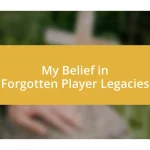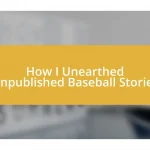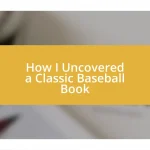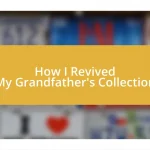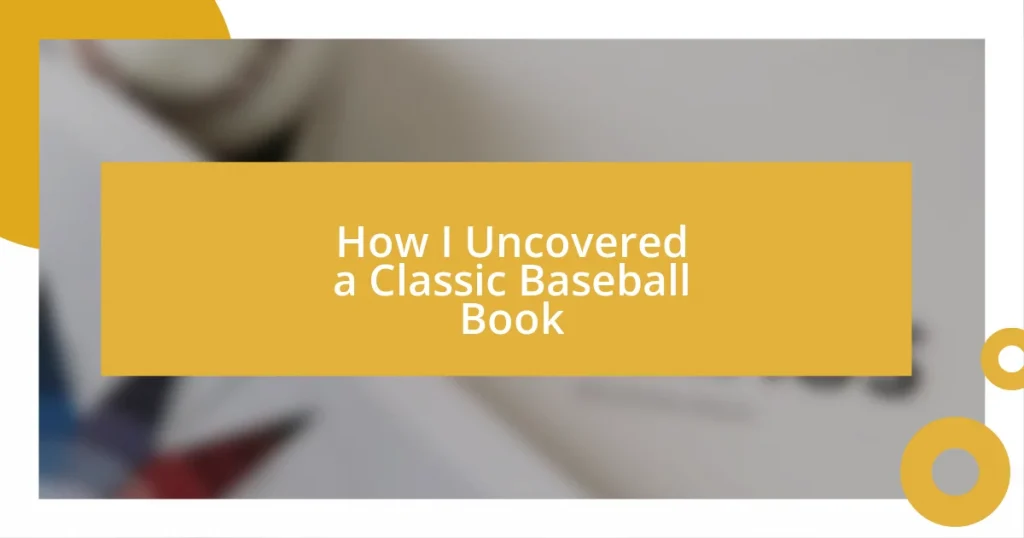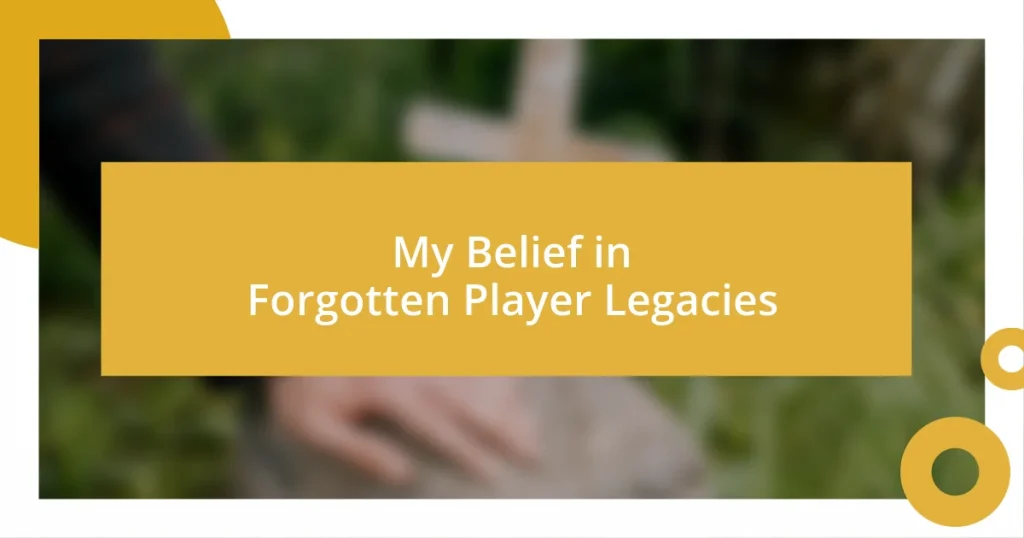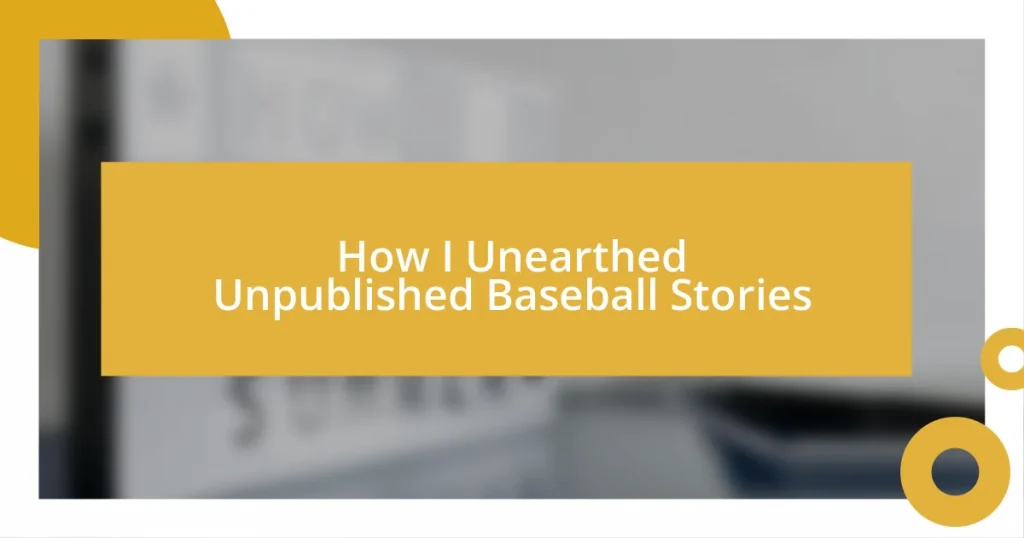Key takeaways:
- Classic baseball literature evokes timeless themes of perseverance and societal issues, highlighting stories that resonate emotionally, such as “The Natural” and “Ball Four.”
- Effective research methods for classic baseball books include online databases, bibliographies from historians, and local book fairs, which help uncover hidden titles and personal stories.
- Documenting findings with personal reflections enhances understanding, and sharing insights with others enriches the baseball community and fosters deeper connections to the literature.
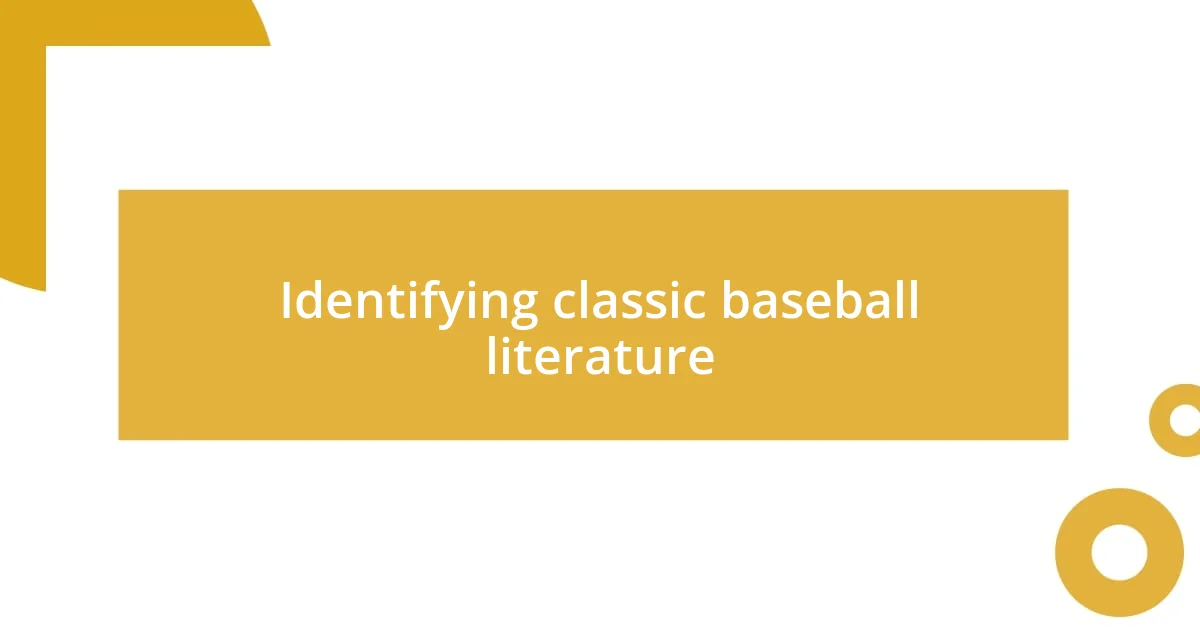
Identifying classic baseball literature
When I think about classic baseball literature, several titles come to mind, but what truly defines a classic? It’s more than just age; it’s the impact the story has on readers and how it resonates with the timeless themes of the game—perseverance, heartbreak, and triumph. I remember the first time I read “The Natural” by Bernard Malamud. The way he captured the essence of hope and redemption through a fallen hero left a lasting impression on me.
As I delved deeper into the genre, I noticed that classic baseball books often convey the broader societal issues of their time. Take “Ball Four” by Jim Bouton, for instance. It wasn’t just a memoir about baseball; it turned the lens on the culture of the 1960s and the realities of being an athlete. It opened my eyes to how sports can reflect the complexities of life, igniting conversations that extend beyond the field.
I often ask myself, which stories continue to evoke strong emotions, even years after their publication? The response often leads me back to books like “Shoeless Joe” by W.P. Kinsella. Its magical realism and heartfelt narrative highlight not just the love of the game but also the dreams and memories tied to it. It reminds me that sometimes, classic literature isn’t just a story; it’s a portal to our own nostalgia and aspirations.
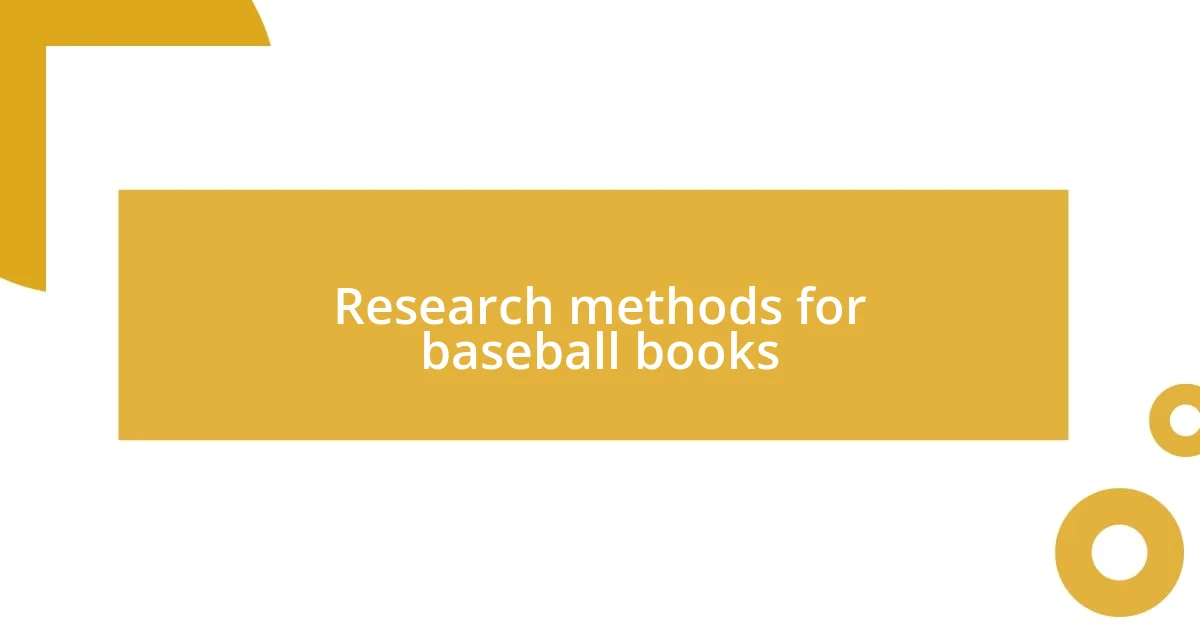
Research methods for baseball books
To properly research classic baseball books, I recommend starting with online databases and library catalogs. I find that platforms like Google Books and WorldCat are invaluable for discovering lesser-known titles. Every time I uncover a gem—like “The Boys of Summer” by Roger Kahn—I feel that thrill of connection to a piece of baseball history that might have otherwise remained hidden.
Another effective method I’ve used is exploring bibliographies of well-respected baseball historians. Their curated lists provide great starting points and expose me to new perspectives. When I first explored Roger Angell’s works, I was amazed at how his essays interwove personal stories with the broader narrative of baseball, enriching my understanding of the game.
Attending local book fairs and engaging with fellow baseball aficionados has also proven fruitful. I remember the excitement of finding a first edition of “The Great American Baseball Book” at a small fair; the seller shared fascinating anecdotes that brought the book’s history to life. This reminds me of the importance of personal connections in uncovering not just books, but the stories behind them.
| Research Method | Description |
|---|---|
| Online Databases | Platforms like Google Books and WorldCat for discovering titles. |
| Bibliographies | Exploring lists compiled by baseball historians for insights. |
| Local Book Fairs | Engaging with sellers to find rare editions and personal stories. |
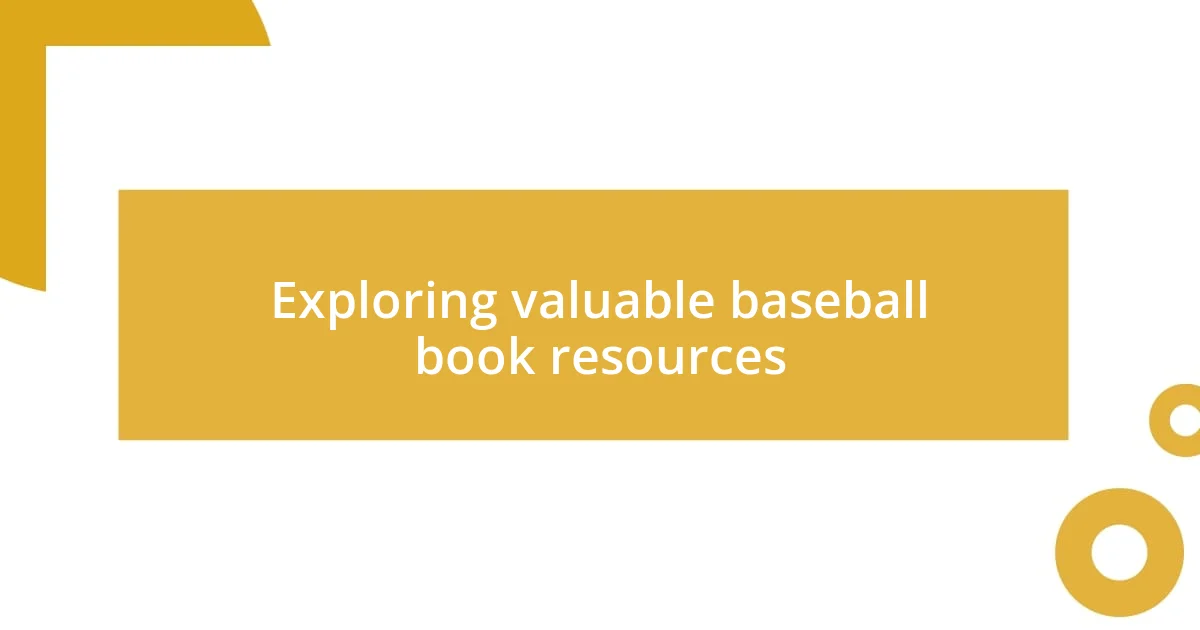
Exploring valuable baseball book resources
When diving into the world of baseball literature, I find some incredible resources that shape my understanding and appreciation of the genre. I often turn to specific online forums and communities, where avid readers and die-hard fans share their insights. I vividly recall the spark of enthusiasm I felt when I stumbled upon a discussion thread about forgotten baseball novels—my pulse quickened as I noted down titles like “The Southpaw” by Mark Harris that I hadn’t encountered before. These vibrant exchanges often lead to unexpected discoveries, opening new pathways to classic literature I thought I knew inside out.
Exploring baseball book resources can be a thrilling adventure. Here are some valuable avenues to consider:
-
Online Forums: Engage in discussions on platforms like Reddit or Goodreads, where readers exchange recommendations and insights.
-
Scholarly Journals: Investigate baseball literature through academic articles, offering a more analytical view of themes and historical context.
-
Social Media Groups: Join Facebook groups focused on baseball literature. Readers often share their latest finds and personal favorites.
-
Documentaries and Interviews: Watch interviews with authors and players, which often shed light on their inspirations and the stories behind the books.
Leveraging these resources has enriched my personal collection and deepened my appreciation for baseball stories. They draw me not just into the history of the game but into the rich tapestry of life experiences reflected in these works.
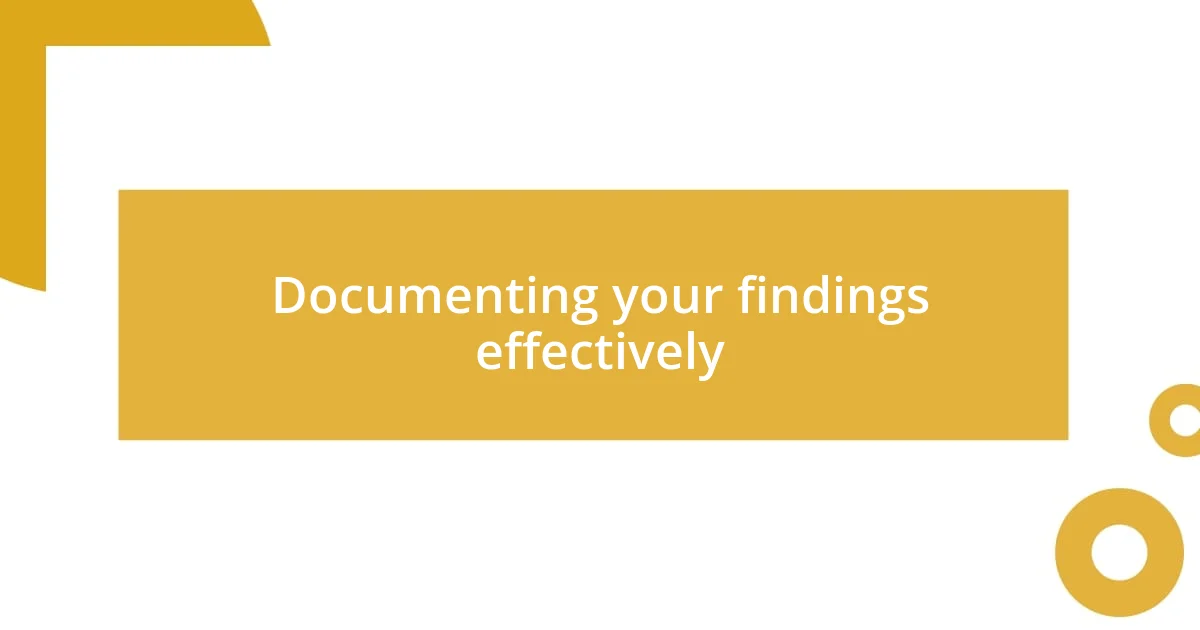
Documenting your findings effectively
Documenting your findings effectively is crucial in piecing together the puzzle of classic baseball literature. I always carry a notebook with me while researching; it feels good to jot down those spontaneous thoughts and impressions. I remember happily scribbling notes during a fascinating talk at a literary event. The speaker shared a story about a rare baseball anthology I’d never heard of, and capturing that moment helped solidify my passion for digging deeper into the subject.
Digital tools can also be lifesavers when documenting discoveries. I use a combination of simple apps to keep track of titles, authors, and even my thoughts about each book. I often think about how overwhelming it can be to manage a growing list of finds, but with tidy organization, I find clarity. For instance, after reading an impactful chapter from “Men at Work” by George Will, I flagged certain passages for later reflection, allowing me to revisit the book’s themes with fresh eyes.
In my experience, finding a classic book is only part of the journey; the real magic lies in how well you record the stories behind each title. I’ve learned to include not just bibliographic details but personal reflections too. When I stumbled upon “Ball Four” by Jim Bouton, I made it a point to jot down why it resonated with me—its candid approach to baseball as a profession, full of humor and heartache, unfolds insights that I wouldn’t want to forget. Have you considered how your own emotional responses to a book could enhance your documentation? Each note becomes a bridge to my evolving understanding and appreciation of the game, and that’s something truly special.
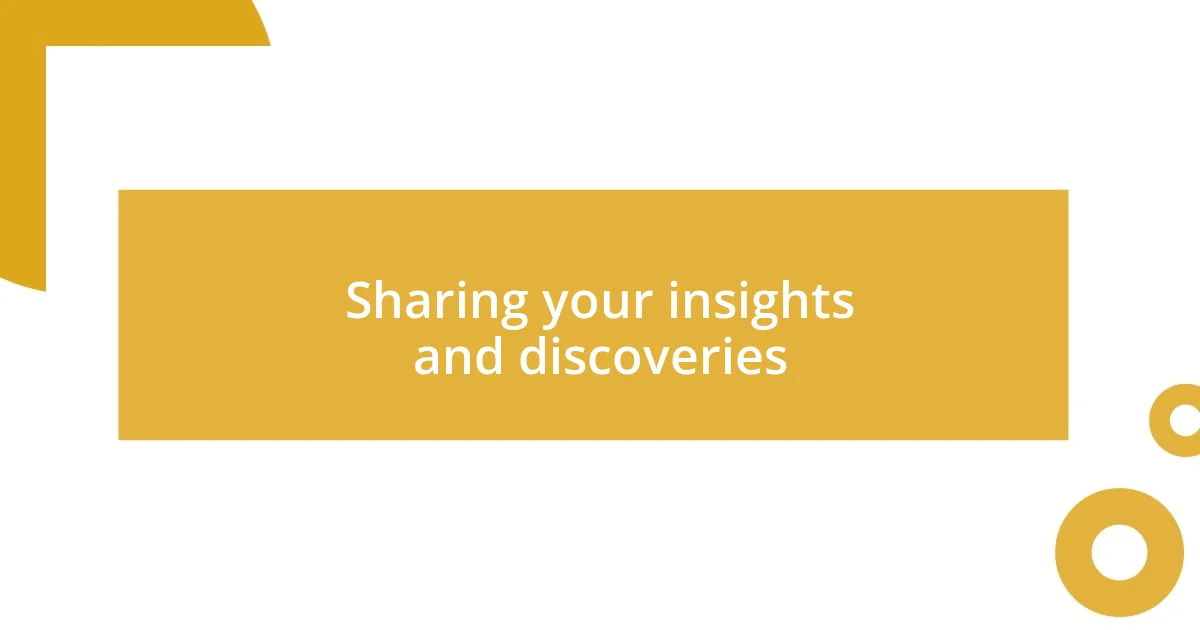
Sharing your insights and discoveries
Sharing insights about my discoveries in baseball literature has been an enjoyable journey. Recently, I found myself engrossed in discussions with fellow enthusiasts at a local bookstore event. One participant passionately recounted how reading “The Boys of Summer” reshaped her understanding of baseball’s emotional resonance. Hearing her share personal experiences tied to the book made me reflect on how literature can evoke powerful sentiments and fuel nostalgia for a time gone by. Have you ever felt that a book unlocks memories you didn’t even know you had?
Every time I stumble upon a hidden gem—a rare text about baseball history—I can’t help but share it with my friends. I remember the buzz of excitement when I uncovered “The Long Season” by Jim Bouton. I instantly texted my buddy, saying it’s a must-read for understanding the game beyond stats and scores. By sharing what I discover, I create a ripple effect, encouraging others to explore these enriching narratives. It feels like what I found is not just mine; it’s a shared treasure waiting for more eyes to see it.
Reflecting on my explorations, I realize that insights can come from the most unexpected places. During one of my trips to a flea market, I came across an old copy of “Eight Men Out.” That moment sparked a lengthy conversation with the vendor about the intricate relationship between baseball and the American experience. Engaging in that dialogue opened my eyes to perspectives I hadn’t considered. Isn’t it fascinating how a casual encounter can lead to profound realizations? Sharing these personal insights not only enriches my journey but also deepens my connection with the wider baseball community.
